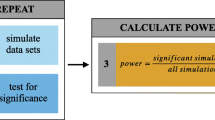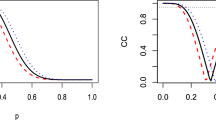Abstract
This article reveals one general scheme for creating counter examples to Bayesian confirmation theory. The reason of the problems is that: in daily life the degree of confirmation is affected not only by probability but also by some non-probabilistic factors, e.g., structural similarity, quantity of evidence, and marginal utility, while Bayesian confirmation theory considers only probabilities to measure the degree of confirmation. This article resolves these problems after some detail analyses, and proposes a new confirmation measure based on these factors.
Similar content being viewed by others
References
Bayes, T., An essay towards solving a problem in the doctrine of chances, Philosophical Transactions of the Royal Society of London 53: 370–418, 1764.
Bernoulli, D., Exposition of a new theory on the measurement of risk, Econometrica 22(1): 23–36, [1738]1954. Translated by Louise Sommer.
Carnap, R., Logical Foundations of Probability (2nd ed.), University of Chicago Press, Chicago, [1950]1962.
Carnap, R., A basic system of inductive logic (Part I), in R. Carnap, and R. C. Jeffrey, (eds.), Studies in Inductive Logic and Probability, vol. 1, University of California Press, Berkeley, 1971.
Carnap, R., A basic system of inductive logic (Part II), in R. C. Jeffrey, (ed.), Studies in Inductive Logic and Probability, vol. 2, University of California Press, Berkeley, 1980.
Crupi, V., K. Tentori, and M. Gonzalez, On bayesian measures of evidential support: Theoretical and empirical issues, Philosophy of Science 74: 229–252, 2007.
de Finetti, B., Foresight: its logical laws, its subjective sources, in S. Kotz, and N. L. Johnson, (eds.), Studies in Subjective Probability, Wiley, New York, [1937]1964, pp. 134–174. Translated by H. E. Kyburg and H. E. Smokler.
Earman, J., Bayes or Bust: A Critical Examination of Bayesian Confirmation Theory, MIT Press, Cambridge, 1992.
Eells, E., Confirmation theory, in S. Sarkar, and J. Pfeifer, (eds.), The Philosophy of Science: An Encyclopedia, Routledge, 2005, pp. 144–150.
Eells, E., and B. Fitelson, Symmetries and asymmetries in evidential support, Philosophical Studies 107(2): 129–142, 2002.
Fitelson, B., The plurality of Bayesian measures of confirmation and the problem of measure sensitivity, Philosophy of Science 66(3): 362–378, 1999.
Fitelson, B., Studies in Bayesian Confirmation Theory, Ph.D. thesis, University of Wisconsin-Madison, 2001.
Fitelson, B., Logical foundations of evidential support, Philosophy of Science 73(5): 500–512, 2007.
Glass, D. H., Confirmation measures of association rule interestingness, Knowledge-Based Systems 44: 65–77, 2013.
Glymour, C., Theory and Evidence, Princeton University Press, Princeton (NJ), 1980.
Goodman, N., Fact, Fiction, and Forecast (4th ed.), Harvard University Press, 1983.
Hempel, C. G., Studies in the logic of confirmation, in Aspects of Scientific Explanation and Other Essays in the Philosophy of Science, Free Press, New York, 1965, pp. 3–51.
Howson, C., A logic of induction, Philosophy of Science 64: 268–290, 1997.
Jeffrey, R. C., The Logic of Decision (2nd ed.), University of Chicago Press, Chicago, 1983.
Jeffrey, R. C., Probability and the Art of Judgment, Cambridge University Press, New York, 1992.
Joyce, J., How probabilities reflect evidence, Philosophical Perspectives 19: 153–179, 2005.
Keynes, J. M., A Treatise on Probability, Macmillan and Co., 1921.
Maher, P., Subjective and objective confirmation, Philosophy of Science 63: 149–174, 1996.
Maher, P., The concept of inductive probability, Erkenntnis 65: 185–206, 2006.
Mortimer, H., The logic of induction, Ellis Horwood series in artificial intelligence, Prentice Hall, Paramus, 1988.
Ramsey, F. P., Truth and probability, in H. Arló-Costa, V. Hendricks, and J. van Benthem, (eds.), Readings in Formal Epistemology, vol. 1 of Springer Graduate Texts in Philosophy, Springer, Cham, [1926]2016.
Ross, S., A First Course in Probability (8th ed.), Pearson Prentice Hall, 2009.
Savage, L. J., The Foundations of Statistics (2nd ed.), Dover, New York, 1972.
Skyrms, B., Pragmatics and Empiricism, Yale University Press, New Haven, 1984.
Acknowledgements
This work was supported by the National Social Science Foundation of China [16CZX051]. I would like to thank the anonymous referees for their valuable comments.
Author information
Authors and Affiliations
Corresponding author
Additional information
Publisher's Note
Springer Nature remains neutral with regard to jurisdictional claims in published maps and institutional affiliations.
Presented by Jacek Malinowski
Rights and permissions
About this article
Cite this article
Yuan, Y. Bayesian Confirmation or Ordinary Confirmation?. Stud Logica 108, 425–449 (2020). https://doi.org/10.1007/s11225-019-09859-0
Received:
Published:
Issue Date:
DOI: https://doi.org/10.1007/s11225-019-09859-0




